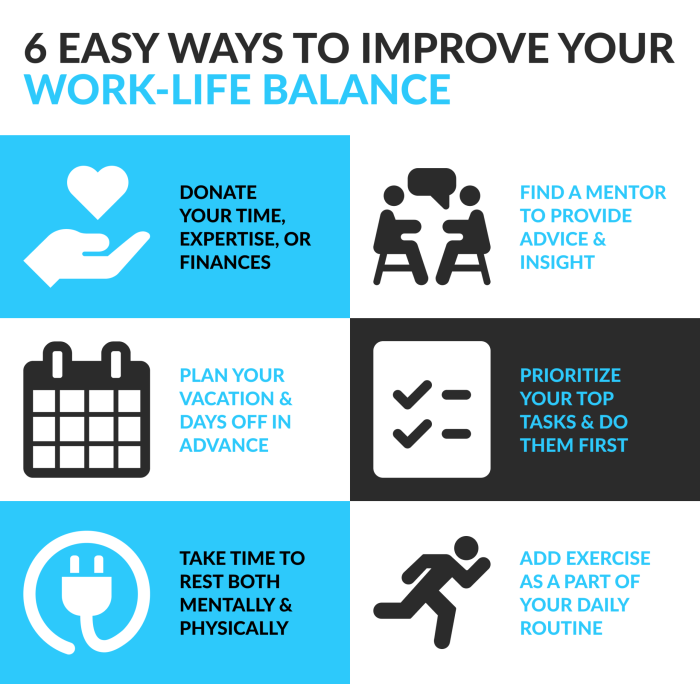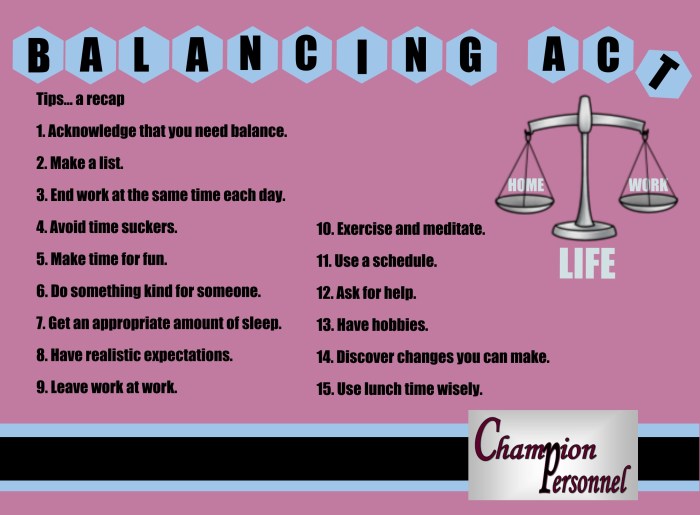Work-Life Balance Tips dives into the importance of finding harmony between work and personal life, offering practical advice for maintaining overall well-being. From time management techniques to setting boundaries, this guide explores key strategies to achieve a balanced lifestyle.
Importance of Work-Life Balance
Work-life balance is crucial for overall well-being as it helps individuals maintain a healthy lifestyle, reduce stress, and improve productivity.
Impact of a Lack of Work-Life Balance
A lack of work-life balance can have significant impacts on mental and physical health. Individuals who are constantly overworked and stressed may experience burnout, anxiety, and depression. This can lead to decreased job satisfaction, strained relationships, and overall dissatisfaction with life.
Benefits of Maintaining a Healthy Work-Life Balance
- Improved mental health: Studies have shown that individuals who have a good work-life balance are less likely to experience mental health issues like depression and anxiety.
- Increased productivity: When individuals have time to rest and recharge outside of work, they are more focused and productive during work hours.
- Enhanced relationships: Spending quality time with family and friends strengthens relationships and provides emotional support.
Strategies for Achieving Work-Life Balance

Finding a balance between work and personal life is crucial for overall well-being. Here are some effective strategies to help you achieve that balance:
Time Management Techniques
Effective time management is key to balancing work and personal life. Utilize tools such as calendars, to-do lists, and time-blocking to prioritize tasks and allocate time for both work and personal activities.
Setting Boundaries
It’s important to set boundaries between work and personal time to avoid burnout. Establish specific work hours and stick to them, and resist the urge to check work emails or messages outside of those hours.
Prioritization Methods, Work-Life Balance Tips
Prioritizing tasks is essential for maintaining a balanced lifestyle. Use techniques like the Eisenhower Matrix to categorize tasks based on urgency and importance, allowing you to focus on what truly matters and avoid feeling overwhelmed.
Remote Work and Work-Life Balance
Remote work has significantly impacted work-life balance for many individuals. With the flexibility of working from home or any location, employees have the opportunity to better integrate their personal and professional lives. However, this shift also comes with its own set of challenges.
Challenges Faced by Remote Workers
- Difficulty in setting boundaries between work and personal life.
- Feeling isolated or disconnected from coworkers and the company culture.
- Struggling with work-life integration, leading to burnout.
- Constantly being available and feeling the pressure to always be online.
Strategies for Creating Boundaries
- Establish a dedicated workspace in your home to separate work from personal life.
- Set specific work hours and stick to them to maintain a routine.
- Communicate your availability to colleagues and establish clear expectations.
- Take regular breaks throughout the day to step away from work and recharge.
- Engage in activities outside of work to maintain a healthy work-life balance.
Mental Health and Work-Life Balance: Work-Life Balance Tips

Maintaining a healthy work-life balance is crucial for our mental well-being. When we neglect this balance, it can lead to increased stress, anxiety, and burnout. Here are some tips on managing stress and preventing burnout in the workplace.
Managing Stress and Preventing Burnout
- Set boundaries: Clearly define your work hours and stick to them. Avoid checking emails or taking work calls after hours.
- Take breaks: Regular short breaks throughout the day can help you recharge and stay focused.
- Practice mindfulness: Engage in activities like meditation or yoga to help reduce stress and improve mental clarity.
- Delegate tasks: Don’t be afraid to ask for help or delegate tasks when you feel overwhelmed.
- Stay organized: Prioritize your tasks and create a schedule to avoid feeling overwhelmed by deadlines.
Importance of Self-Care Practices
Self-care is essential for maintaining a healthy work-life balance. Here are some self-care practices you can incorporate into your routine:
Remember, you can’t pour from an empty cup. Taking care of yourself is not selfish, it’s necessary.
- Exercise regularly: Physical activity can help reduce stress and improve your overall mood.
- Get enough sleep: Aim for 7-8 hours of quality sleep each night to ensure you are well-rested and able to tackle the day ahead.
- Eat well: Fuel your body with nutritious foods to maintain your energy levels and overall well-being.
- Connect with loved ones: Spending time with friends and family can provide emotional support and help you feel more connected.
- Prioritize hobbies: Engaging in activities you enjoy outside of work can bring joy and fulfillment to your life.






